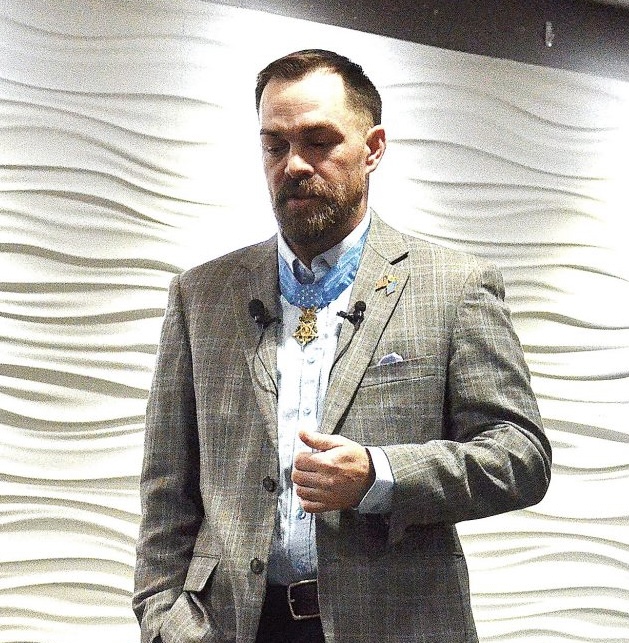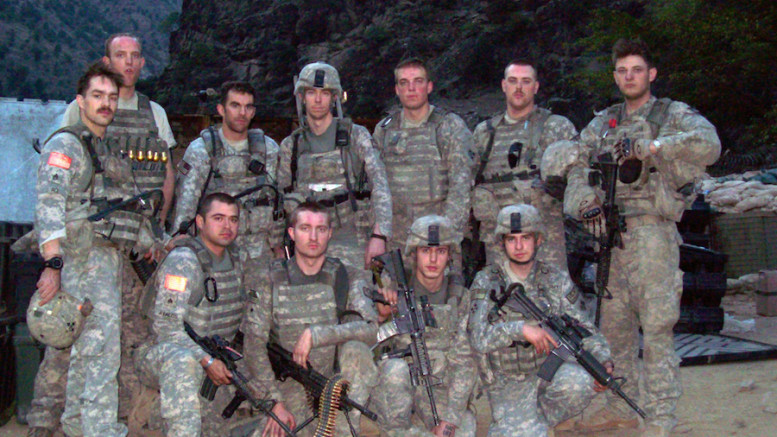
Every year, the Simpson Cup serves up players who've endured experiences that civilians like us simply can't imagine. This year is no exception, and the tale of Team USA's Clinton Romesha is as compelling as any.
When the California-born Romesha first enlisted in the U.S. Army back in 1999, he did so in a world which now feels like a distant memory. The war on terror hadn't yet begun, and he - like many of his compatriots - wondered if he'd ever see real combat.
Little did Romesha know that he'd go on to become a distinguished leader in battle, and subsequently receive America’s most prestigious military decoration: the Medal of Honor.
"The military is in my blood," reflects the 41-year old. "My grandfather was a WWII veteran, my dad did two tours in (Viet)nam, and my brothers served too. Growing up in a rural community, I got tired of milking cows and digging fence posts, and I wanted to see what was out there."
Romesha's initial overseas postings saw him based in Germany (where he also deployed to Kosovo) and South Korea, before volunteering himself for a tour supporting Operation Iraqi Freedom. But it was his deployment to Afghanistan in May 2009 which changed his life forever.
Less than six months after arriving, his unit was assigned to Combat Outpost Keating in the Kamdesh District. Located in a valley surrounded by steep mountains, it came under regular attack - so much so that U.S. commanders opted to close the outpost by the Fall of 2009, considering it indefensible.
Shortly before that came to pass though, Taliban fighters launched a coordinated attack in the early hours of October 3, 2009. In what would later become known as the Battle of Kamdesh, roughly 300 Taliban laid siege to the outpost armed with recoilless rifles, rocket-propelled grenades, mortars, machine guns and small arms - leaving the 85-strong International Security Assistance Force (which included 52 members of the U.S. Army) heavily outnumbered.
After three hours of intense mortar and fire, the Taliban fighters breached the compound and set fire to it. It was then that Romesha really took charge of the situation, and somehow turned the tide.
Despite being targeted by heavy fire (and a sniper), he broke cover to scope the area and seek reinforcements from a nearby barracks. Romesha then organized a five-man team to counter-attack, before neutralizing one of the Taliban fighters' machine gun teams.
While engaging a second, he took cover behind a generator which was struck by a rocket-propelled grenade, resulting in severe shrapnel wounds to his neck, shoulder and arms. But injuries wouldn’t stop him, and he then directed air support that killed 30 enemy fighters, before taking out several more Taliban positions himself.

This enabled the troops to regroup, and outlast a force superior in numbers. The fight lasted 12 hours, and eight American soldiers were killed. But without Romesha's extraordinary courage, the death toll would have been a lot higher.
"A lot went on that day," the now-North Dakota resident recalls, with more than a hint of understatement. "It's something you never think you’ll be a part of – stuff like that happens to other guys. But the enemy hit us hard. They hated us; they wanted to kill every one of us. And they had the upper hand - they’d planned this thing to a tee."
He continued: "Thankfully, I wasn’t alone that day. We had 52 guys fighting together. All of us would do whatever we could, and sacrifice anything for each other. That’s something I’ll never forget."
With typical humility, Romesha regularly downplayed his role at Kamdesh in the years that followed. But a nation duly gave one of its heroes the recognition he deserved, and he was awarded the Medal of Honor by President Obama at the White House in 2013.
"To be honest, I don’t remember much about that day - it was a blur of emotions," Romesha noted in earnest. "Never in a million years did I think I’d be in that position. No one says ‘Hey, I’m gonna go out there today and win the Medal of Honor’. You don’t win it, you receive it. And it’s just so humbling to have that recognition.”
He added: "My family got shown round the White House; we met President Obama in the Oval Office, and the kids were jumping on his furniture! When it came to the ceremony, I just blanked out. In a way, it almost felt dirty. I was a leader, and there were eight men I didn’t bring home.
"But then once the President started reading the citation, I saw my family. I saw the Gold Star families, and my military family there too - all there to share it with me. And I realised I wasn’t doing this by myself, and that everyone was there with me, and everyone was getting the recognition for it."
Such modesty belies his tremendous bravery, and it goes without saying that he is fully deserving of his MOH gong - one which has been awarded to just 3,525 men and women at the time of writing. Romesha also shared his story with the world when he published his book, Red Platoon, back in 2016 - documenting the Battle of Kamdesh. It meant more unwanted time in the limelight, but it was something which ultimately proved therapeutic - and not just for him.
"At first I was completely against the idea of a book," Romesha says emphatically. "Making myself the center of attention didn't feel right. But as time went on, I spoke to my battle buddies, and they said the best way to tell our story was with a first-hand account. Especially for the Gold Star families.
"It took almost two years to write the book. I travelled the country to speak to everyone from our group. A lot of the guys had never even talked about what happened, and certainly never had the platform to do it. It was a great way to redirect the spotlight away from me to what the other guys did. A lot of people ended up asking me after reading the book, 'so what the hell did you do?', and I loved that - I thought it was right on point.
“The best feedback I had was from the Gold Star families though. They said they finally felt closure, because they'd never known the full story about what happened to their loved ones until we started talking about it, and putting the book together. That was the most rewarding part for me."
Of course, the next chapter in the remarkable life of Clint Romesha involves the Simpson Cup, which is the culmination of his three-year journey as a member of the On Course Foundation (OCF). And as someone who is heavily involved with charitable organizations geared at helping U.S. veterans, the 20-handicapper reserves particular praise for the Foundation.
"I first came across OCF at an event with another non-profit in 2019, and I was so impressed when I heard what it was all about," Romesha beams. "It’s not just handouts for veterans, it gives them opportunities to forge their own path in life, and delivers long-term solutions.
"For me, it inspired me to figure out this crazy game of golf. I only picked up a club for the first time at 33, so it's been a steep learning curve! But becoming a member of the Foundation, and aspiring to be on the Simpson Cup team has given me a goal to focus on.
"I can't wait to connect with my teammates, and also my brothers from the other side of the pond. I got to serve with so many foreign allies, and their militaries. We may be from different countries, but we're all cut from the same cloth. There's that unmistakable rivalry, but it's one underpinned by love, camaraderie and respect – and the Simpson Cup is the perfect way to showcase that."
|